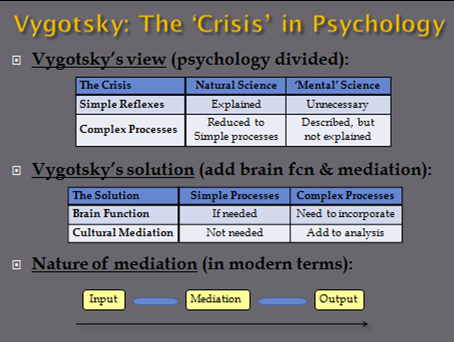Mind and culture – Vygotsky’s view May 30, 2009
Posted by thedukeofurl in Culture, Mind, Psychology.Tags: behaviorism, brain, Chinese room, humans and machines, logic, Searle, Turing test, Vygotsky
trackback

Culture and mind are closely related, more closely than most of us realize. And the situation has not much altered since Vygotsky’s time – he died in 1934. My summary of Vygotsky’s views are based on his Mind in Society: The Development of Higher Psychological Processes (1978). The mediation that Vygotsky had in mind was not that of either S-R or S-R-S stimulus-response theory so beloved by the behaviorists, but one involving symbolic activity on the part of the person, in particular on sign use. For him, higher complex psychological processes were not reducible to atomistic simple reflexes, as this could not take account of the integrative character of the higher processes. On neural integration, see Goldberg, The Executive Brain (2001).
For the behaviorists, the mediating functions of the brain were considered to be as simple as possible. For Vygotsky, more structure and associated functionality had to be built into our conception of the brain’s activity. Moreover, it was necessary to add brain functioning to descriptions of psychological processes, necessarily at complex levels but also at simple levels when activity other than simple reflexes were involved.
In Vygotsky’s opinion, what was required was a more integrated approach to the analysis of psychological processes that could explain both simple reflexes and the complex higher processes by means of the same framework that did violence to neither. An explanation of complex processes in terms of combinations of simpler processes did justice to neither and was misleading about both. In particular, what needed to be shown was how culture was associated with the higher psychological processes that involved the symbolic activity which was absent in the simpler processes. The reductionist explanations of his time and of ours were, and still are, unable to do this.
Comments»
No comments yet — be the first.